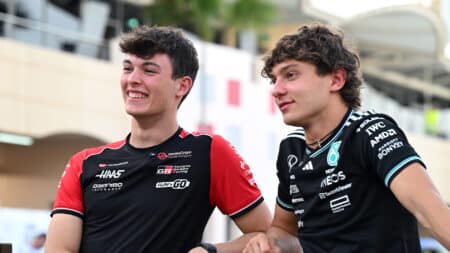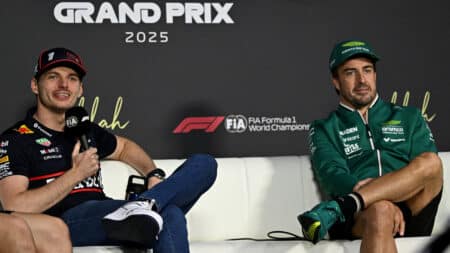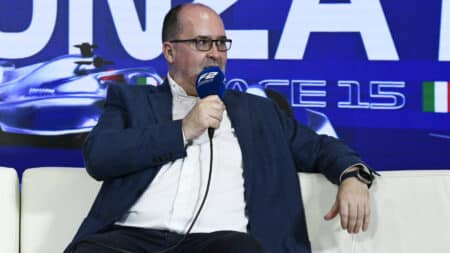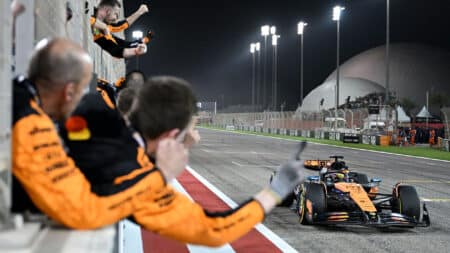“To me,” said Derek Bell during last week’s Motor Sport podcast, “Fernando Alonso is the most talented driver out there. He always puts in an amazing performance – he drives the car to the end of the world to make it win. Surely to goodness, eventually Ferrari are going to have to give him a car that will do the job…”

Over time I have found, in talking to Grand Prix drivers of the past, that to a man they consider Alonso the greatest driver of this generation. One of them, indeed, occasionally sends me texts expressing outrage at Ferrari’s continuing inability to provide him with a competitive car.
That said, history shows that Fernando is far from the only man to find himself in this situation. In the course of its long history Ferrari has, of course, gone through glorious periods, benefiting such as Ascari, Lauda andSchumacher, but all too often its drivers have been frustrated by their cars’ failure to match the best of its competition.

“When you first go there,” Gilles Villeneuve said to me once, “and you see the racing department, Fiorano, and everything else, you wonder how they ever manage to lose a race. But the longer you are with them, the more you understand…”
Like Villeneuve, Alonso has driven middling Ferraris for several years, and – like Gilles – he has consistently flattered his cars. Martin Whitmarsh, late of McLaren, saw parallels between the two drivers, not least their warrior mentality. “I never knew Gilles because he was before my time,” he said, “but to the day he died he had a hunger that had nothing to do with how much money he’d made, or any of that stuff.
“That’s what you always want to see in a driver, and – for all the success he’s had – the hungriest driver out there today is Alonso. You could triple his net worth, and he’d still have that hunger. It’s in his makeup. What you always look for is the car that’s scoring points it shouldn’t be – and who’s driving it. For a long time that, overwhelmingly, has been Fernando.”

So, in his own era, it was Gilles. “He was,” said the late Harvey Postlethwaite, “the most unpolitical person I ever met. No hang-ups about anything whatsoever. In front of the Old Man, Gilles would say that the car was shit, that it had no downforce and he was wasting his time. ‘I’ll drive it,’ he’d say, ‘all day long, because that’s my job and I love doing it. I’m just telling you we’re not going to be competitive…’ Just disarmingly honest, you see, and the Old Man loved him for it…”
Ah yes, the Old Man. During Villeneuve’s racing days, he was still very much at the helm of his company. As we know, he was never much interested in the road cars: it was racing that mattered to Enzo, and in drivers the quality he valued above all was fighting spirit. Hence his particular admiration for Nuvolari, Moss and Villeneuve.
Alonso is more of a political animal than any of them, which would not have been to the Old Man’s taste, but as a pure racing driver he would have fitted the template perfectly.

Almost from the day Fernando arrived in Maranello he was suggesting that he had found his spiritual home, that he hoped to stay with the team for the rest of his career. Gilles used to say much the same thing: “There are times when I think I’ve had enough, and I should go somewhere else, but… I’m hopeless! I see the Old Man again, and say, ‘OK, where do I sign?’”
That said, in the last few months of his life there is no doubt that Villeneuve was thinking ever more seriously about leaving Ferrari for ‘an English team’. There had long been offers on the table from such as McLaren and Williams, and at the Brazilian Grand Prix in 1982 he told me of his inclination to sign with Ron Dennis. I don’t doubt that the fateful race at Imola, where Didier Pironi ‘stole’ the victory from a cruising Gilles on the last lap, would have sealed the deal.
He had, after all, begun his Formula 1 career with McLaren, driving a third car in the 1977 British Grand Prix, and stunning one and all with his flair and pace. Had not Teddy Mayer unfathomably declined to take up his option, going instead for Patrick Tambay, Villeneuve would never have gone to Ferrari in the first place.

Now, more than 30 years on, there exists the possibility that another Ferrari driver will leave to rejoin McLaren. Alonso drove for the team in 2007, but although the partnership produced success, no one needs reminding that as time went by the relationship became ever more acrimonious, each party blaming the other, both agreeing to part company after a single season.
One might, to put it mildly, have predicted with some confidence that any future relationship between McLaren and Alonso was out of the question, but never say never in Formula 1. “For all the differences we had in the past,” Whitmarsh told me a couple of years ago, “I’d have him back tomorrow. Why? Because he’s the best, and that’s all that matters…”
Towards the end of last year Whitmarsh several times spoke to Alonso about a possible rapprochement, and many – myself included – believe that ultimately a deal would be done. Fernando allowed that he had been flattered by Martin’s complimentary remarks: the past was the past, and his only problem at McLaren, he said, had been ‘the philosophy of someone who isn’t there any more…’

At the beginning of 2014, though, everything changed. Whitmarsh was deposed in what may be termed a palace coup, and suddenly ‘the man who wasn’t there any more’ – Ron Dennis – was very much there again. Now, surely, any question of a new relationship between Alonso and McLaren had evaporated.
Or perhaps not. The one quality that unites all the successful folk in F1 – both Dennis and Alonso have it in spades – is an animal need to win, and neither has done much of it in the recent past. At the moment acres of space in Italian newspapers are being given over to Fernando’s future: will he stay at Ferrari, or make a move?
Undoubtedly his frustrations run deep. Not only have the cars fallen short for five years, Alonso has wished to have more influence on which engineers Ferrari should employ. Most of all, a couple of years ago, he urged them to hire Pat Symonds, whom he rated very highly after several years of working with him at Renault. Ferrari, however, said no, as they did to several other of his suggestions.

Then there was the cycling team. A close friend of Alberto Contador, Fernando has a long-standing ambition to set up his own team, but again Ferrari, fearful that this might detract from his commitment to F1, expressed disapproval.
Recently Alonso asked Ferrari for the freedom – if, after the first five races of 2015, the car wasn’t competitive – to be released from his contract at the end of the season, a year before its expiry. Again the answer was no.
It is believed, however, that although all the engineers and technicians devoutly want Alonso to stay, one part of Ferrari – headed by Marco Mattiacci, who replaced Stefano Domenicali earlier this year – wants to change direction, and to replace Fernando with Sebastian Vettel. Indeed a well-informed Italian colleague tells me that the word is that Mattiacci is hoping that Fernando will ask to be released for next year – in which event he would reputedly not be obliged to pay the 25 million euros required to buy out his contract.

Why, though, would Mattiacci wish to see him leave? Because, according to the Italian grapevine, he knows that Alonso is the de facto leader of the team, and he wants to demonstrate that he is in charge, that his law must be accepted, and he believes that with Vettel that would be easier to achieve – not least because, unlike Alonso, fully conversant both with the language and the mentality at Ferrari, Sebastian doesn’t even speak Italian…
Sergio Marchionne, who fired Luca di Montezemolo earlier this month, and will replace him as president of Ferrari on October 14, is known to be a great supporter of Alonso, but the man credited with saving the Fiat Group has much else on his plate, and, unlike Luca, will not be able to devote all his time to Ferrari. Mattiacci, apparently keen to demonstrate his power, assuredly has a lot more of it than ever went the way of Domenicali.
Even by Ferrari standards, this has been a year of tumultuous upheaval, with Domenicali, Luca Marmorini and di Montezemolo all gone within six months. Who knows how the next few will go, but it could be that Ferrari will head off to Melbourne next March without the driver who has kept the team alive for the last five years.

During that time there have been 11 Grand Prix victories for Ferrari, all of them scored by Alonso. As I write, prior to the Japanese Grand Prix, Fernando has scored 1162 points in that period, his team-mates – Massa and Räikkönen – 541.
A couple of quotes from the Singapore weekend. “Without Fernando Alonso Ferrari would be nowhere…” said Niki Lauda, and then there was this from Giancarlo Minardi, for whose little team Fernando made his F1 debut back in 2001: “If Ferrari lose Alonso, it will be a disaster for the team, and it will last for years…”
The situation is very much in Fernando’s hands: he goes only if he wants to go. Some believe he will stay, encouraged by the thought of James Allison’s first Ferrari, inevitably haunted to some degree by the thought, after five years of working with loaves and fishes, of quitting the team at just the wrong time, as did Chris Amon in similar circumstances back in 1969.

Or will Alonso decide to cut his losses, and take the risk of returning to McLaren, whose recent seasons have been less than stellar, who are going into 2015 with a brand-new engine, and with whose proprietor Fernando did not get along seven years ago?
It’s no secret that Honda is desperate to have him, and at any price, but I’d say that the balance of probability is that in the end Alonso will stay put next year, hoping finally to cash in on all those years of thwarted effort and inspiration, but then, if he sees no worthwhile progress, make a move in 2016.
There again, there are those who murmur that Fernando’s confirmation as a McLaren-Honda driver could be announced as early as next weekend, in Suzuka. I’ll admit that would surprise me, but I’ve been wrong before…














